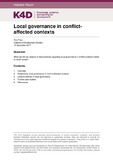| dc.contributor.author | Price, Roz | |
| dc.coverage.spatial | Democratic Republic of the Congo | en |
| dc.coverage.spatial | DRC | en |
| dc.coverage.spatial | Somalia | en |
| dc.coverage.spatial | Syria | en |
| dc.coverage.spatial | Yemen | en |
| dc.date.accessioned | 2018-12-13T13:47:04Z | |
| dc.date.available | 2018-12-13T13:47:04Z | |
| dc.date.issued | 2017-11-15 | |
| dc.identifier.citation | Price, R.A. (2017). Local governance in conflict-affected contexts. K4D Helpdesk Report 234. Brighton, UK: Institute of Development Studies | en |
| dc.identifier.uri | https://opendocs.ids.ac.uk/opendocs/handle/20.500.12413/14179 | |
| dc.description.abstract | What are the key lessons or best practices regarding local governance in conflict contexts similar to South Sudan? Although no two conflicts are alike, many have comparable areas of dispute and it is therefore possible for lessons learned to be discussed in relevant examples. This review looks at lessons learned from local governance initiatives and experiences in other fragile and conflict-affected states. While incorporating lessons learned in other countries might be helpful, it is important not to assume that all of those lessons are necessarily applicable to other conflict situations. A key piece of literature related to these learnt lessons is from a recently developed UNDP How-To Guide on Local Governance in Fragile and Conflict-affected Settings: Building a Resilient Foundation for Peace and Development. Local governance is an open, evolving and multi-dimensional system, involving formal and informal stakeholders of different institutional nature and legitimacies. Given the complexity of local governance in conflict-affected contexts, the uniqueness of different conflict-affected contexts, and the time constraint of 5 working days, this review only gives a brief overview of lessons learnt and is not exhaustive. Nor is it able to provide recommendations for interventions. Where possible examples have been taken from conflict-affected contexts including the Democratic Republic of the Congo (DRC), Somalia, Syria and Yemen. However, some lessons learnt are more general where the literature indicates that these are relevant to fragile and conflict-affected states but explicit examples from conflict-affected states have not been found. Two further in-depth examples with lessons learned from Somalia and Syria are discussed in the final section. Literature argues against using a ‘best practice’ approach to local governance, and instead a ‘best-fit’ approach is suggested, whereby initiatives ‘work with the grain’, building on what is already there and works in a local context, and a shift towards local problem-solving. | en |
| dc.language.iso | en | en |
| dc.publisher | IDS | en |
| dc.relation.ispartofseries | K4D Helpdesk Report;234 | |
| dc.rights.uri | https://www.nationalarchives.gov.uk/doc/open-government-licence/version/3/ | en |
| dc.subject | Governance | en |
| dc.subject | Politics and Power | en |
| dc.subject | Security and Conflict | en |
| dc.subject | Social Protection | en |
| dc.title | Local Governance in Conflict Affected Contexts | en |
| dc.type | Other | en |
| dc.rights.holder | © DFID - Crown copyright 2018. | en |
| dcterms.dateAccepted | 2017-11-15 | |
| rioxxterms.funder | Department for International Development, UK Government | en |
| rioxxterms.identifier.project | K4D | en |
| rioxxterms.version | VoR | en |
| rioxxterms.funder.project | 238a9fa4-fe4a-4380-996b-995f33607ba0 | en |

